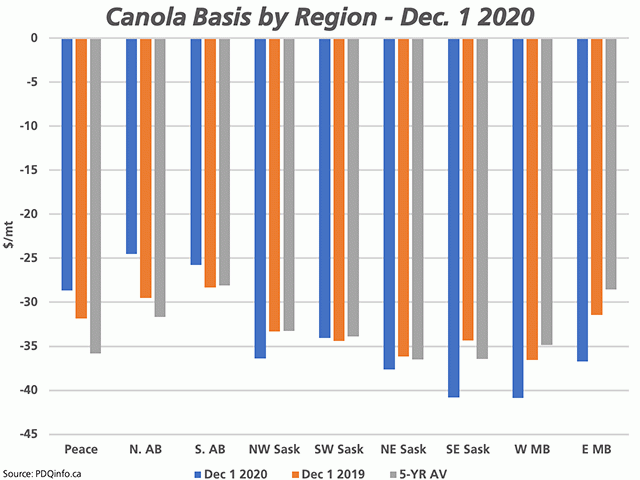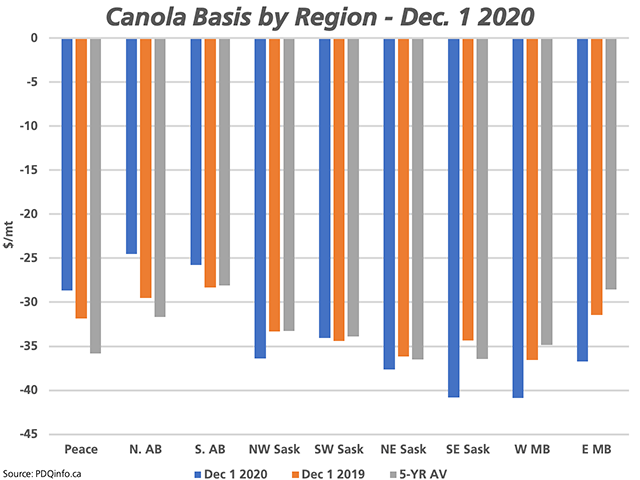Canada Markets
Is Canola Trade Signaling a Bullish Report Ahead?
Ahead of the Dec. 3 Statistics Canada final production estimates -- which are never really final as they face possible revisions for a period of two years -- the market is sending potential signals of concern and uncertainty.
December 2 trade resulted in a $4.20/metric ton (mt) loss for the Jan canola contract, while ending close to the midpoint of the session's $8.10/mt range. Weakness was seen across the soy complex as well as rapeseed while the Canadian dollar gained strength against the USD, acting as bearish factors, partially tied to a bearish 7-day forecast for Brazil.
This follows Dec. 1 trade, that saw the Jan contract close $5.70/mt higher, despite losses seen across the entire soy complex along with rapeseed while the Canadian dollar strengthened against the U.S. dollar for a sixth straight session.
So far this week, Jan soybeans are down 3.3%, Feb rapeseed is down 2.5% and Feb Malaysian crude palm oil is down .7%. This compares to a .6% drop in Jan canola over the first three days of this week. Only Jan canola and Feb crude palm oil remain above their respective 20-day moving average.
P[L1] D[0x0] M[300x250] OOP[F] ADUNIT[] T[]
On Dec. 1, the ICE Exchange reported the Vancouver cash basis strengthening $5/mt to $40/mt over the Jan contract, which compares to $18 over this time last year. A combination of strengthening West Coast trade and futures resulted in a potential $10.70/mt increase in price on Tuesday, during a session of weakness seen across the global market.
While the comment was made on Dec. 1 that the export basis strength should ripple across the country, it did not take long. Daily cash price data from pdqinfo.ca shows Prairie basis strengthening across the nine regions monitored, from $1.66/mt in southeast Saskatchewan to $5.36/mt in northwest Saskatchewan, while averaging $3.86/mt across the nine regions. The Jan futures contract closed just $3.20/mt below the contract high (also its highest trade in over seven years), cumulative producer deliveries are 14.3% above the year-ago volume, commercial stocks are 1.7% higher than a year ago and yet the market is sending bullish signals.
While soybeans and products are turning lower, Jan. canola has moved over a $14.70/mt range for the past nine sessions, with the Dec. 2 close near the midpoint of the range. Another clue is in trade volume, with Dec. 1 volume on the nearby contract of 11,192 contracts resulting in a $5.70/mt gain while Dec. 2 volume of 11,514 contracts resulted in a $4.20/mt loss. Neither buyers nor sellers seem willing to take charge.
As seen on the attached chart, basis reported for the three regions of Alberta -- the Peace, Northern Alberta and Southern Alberta -- is stronger than Dec. 1, 2019, and the 5-year average for this day (blue bars as compared to the brown and grey bars), following the strengthening basis reported on Dec. 1. Across Saskatchewan and Manitoba, there remains room for basis to strengthen.
DTN 360 Poll
This week's poll asks what you think of the interim trade deal announced between Canada and the United Kingdom. You can weigh in with your thoughts on this poll, which is found at the lower right of your DTN Canada Home Page.
Cliff Jamieson can be reached at cliff.jamieson@dtn.com
Follow Cliff Jamieson on Twitter @Cliff Jamieson
(c) Copyright 2020 DTN, LLC. All rights reserved.





Comments
To comment, please Log In or Join our Community .